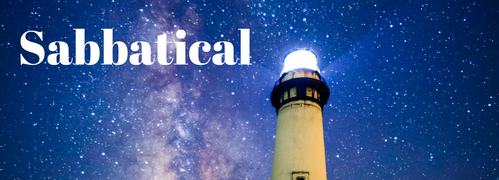

Daily Primer — August 7, Isle of Lewis, Outer Hebrides — Scotland
Each day you will be given:
A Florilegium entry
A Daily Prayer
and a Night Prayer.
A Florilegium entry
A Daily Prayer
and a Night Prayer.

Holy Places & The Place Of The Holy
"To go to Rome
Is much of trouble, little of profit;
The King whom thou seekest there,
Unless thou bring Him with thee,
Thou wilt not find."
Perhaps this poetry is so often quoted because its sentiment is so obviously true. The trip to Rome, in and of itself, is potentially pointless and profitless. And yet, annually tens of thousands trek to Rome on pilgrimage and millions of the faithful in nearly every sacred tradition do the same on pilgrimage to Lourdes, to Iona, to Mecca, or to the shrines of Buddhist fame — to name only a few. Surely we can surmise that not all of these faithful are misguided in their taking time and treasure and trouble to “go” in search of God by the prayer of their feet along the path, their voice raised in pilgrim’s praise, their pens deployed in the service of prophetic poetry, and their hearts softened to receive the grace they so earnestly seek.
Making a travel pilgrimage to a sacred destination has a long and celebrated history. But it has not been without its detractors. “Both Gregory of Nysa and Jerome questioned certain features [of pilgrimage] . . . [Gregory] was quite certain that going on pilgrimage was not something required by Christ, but [Jerome] was prepared to state, ‘it is still your duty as believers to worship on the spot where the Lord's feet once stood and to see for yourself the still fresh traces of his birth, his cross and his passions.’” Both Gregory and Jerome were in agreement, however, that there was no special measure of grace given to Jerusalem (or any other holy spot) and that God, whom heaven and earth could never contain, was present in all places. “Gregory was also sure that ‘change of place does not affect any drawing near to God, but wherever you may be God will come to you.’”
As we enter holy-places we do well to consider the place of the holy within us. What is it that our heart wants to behold? Who is it that we yearn to encounter? When our eyes first behold the resting place of a saint of the faith; when the ferry finally approaches the island of Iona; when the organ of the choir sets our soul aflame with a deeper encounter with the holy inside a cavernous cathedral; it is in these moments (and countless others too) when, if we are truly present to the moment, we will recognize the place of the Holy in that holy-place.
To receive the encounter with the Holy which God desires to give us, we will likely need to let go of the encounter we have dreamed of. We are not magicians and God will not be conjured, no matter how deeply we may wish to have the Holy on our terms and at our convenience. Rather, if we will adopt the posture of receptivity, if we will remain alert to the ways God is speaking, if we will hone the habits of keeping vigil for Christ in mundane experiences, we will more likely be able to receive the holy encounters which God is providing us each day.
"To go to Rome
Is much of trouble, little of profit;
The King whom thou seekest there,
Unless thou bring Him with thee,
Thou wilt not find."
Perhaps this poetry is so often quoted because its sentiment is so obviously true. The trip to Rome, in and of itself, is potentially pointless and profitless. And yet, annually tens of thousands trek to Rome on pilgrimage and millions of the faithful in nearly every sacred tradition do the same on pilgrimage to Lourdes, to Iona, to Mecca, or to the shrines of Buddhist fame — to name only a few. Surely we can surmise that not all of these faithful are misguided in their taking time and treasure and trouble to “go” in search of God by the prayer of their feet along the path, their voice raised in pilgrim’s praise, their pens deployed in the service of prophetic poetry, and their hearts softened to receive the grace they so earnestly seek.
Making a travel pilgrimage to a sacred destination has a long and celebrated history. But it has not been without its detractors. “Both Gregory of Nysa and Jerome questioned certain features [of pilgrimage] . . . [Gregory] was quite certain that going on pilgrimage was not something required by Christ, but [Jerome] was prepared to state, ‘it is still your duty as believers to worship on the spot where the Lord's feet once stood and to see for yourself the still fresh traces of his birth, his cross and his passions.’” Both Gregory and Jerome were in agreement, however, that there was no special measure of grace given to Jerusalem (or any other holy spot) and that God, whom heaven and earth could never contain, was present in all places. “Gregory was also sure that ‘change of place does not affect any drawing near to God, but wherever you may be God will come to you.’”
As we enter holy-places we do well to consider the place of the holy within us. What is it that our heart wants to behold? Who is it that we yearn to encounter? When our eyes first behold the resting place of a saint of the faith; when the ferry finally approaches the island of Iona; when the organ of the choir sets our soul aflame with a deeper encounter with the holy inside a cavernous cathedral; it is in these moments (and countless others too) when, if we are truly present to the moment, we will recognize the place of the Holy in that holy-place.
To receive the encounter with the Holy which God desires to give us, we will likely need to let go of the encounter we have dreamed of. We are not magicians and God will not be conjured, no matter how deeply we may wish to have the Holy on our terms and at our convenience. Rather, if we will adopt the posture of receptivity, if we will remain alert to the ways God is speaking, if we will hone the habits of keeping vigil for Christ in mundane experiences, we will more likely be able to receive the holy encounters which God is providing us each day.
The first quote:
Ancient advice about pilgrimage - here as found in: Waal, Esther de The Celtic Way of Prayer: The Recovery of the Religious Imagination (p. 3).
Then quote from Saint Gregory:
J.G. Davies, Pilgrimage Yesterday and Today pp.80—ff. This chapter is on pre-Reformation criticisms of pilgrimage starting with the 4th Century.
The overall entry is from:
PHL - taken from the first Peregrination Primer, 2015.
Ancient advice about pilgrimage - here as found in: Waal, Esther de The Celtic Way of Prayer: The Recovery of the Religious Imagination (p. 3).
Then quote from Saint Gregory:
J.G. Davies, Pilgrimage Yesterday and Today pp.80—ff. This chapter is on pre-Reformation criticisms of pilgrimage starting with the 4th Century.
The overall entry is from:
PHL - taken from the first Peregrination Primer, 2015.
Florilegium is the Medieval Latin word for bouquet, or more literally flowers (flos, flor-) which are gathered (legere). The word florilegium was used to refer to a compilation of writings, often religious or philosophical. These florilegium are literary flowers—beautiful words/prayers/thoughts I have gathered. During my sabbatical they will give me something to ponder each day. — PHL.

We give thanks, our Lord and God,
for saints Rita, Cecile, Cuthbert, Mungo and Columba, and the unnumbered company of witnesses whose prayer and love surround us.
May they, although unseen,
sustain and strengthen us
on our journey towards your light,
Jesus Christ, our Lord.
for saints Rita, Cecile, Cuthbert, Mungo and Columba, and the unnumbered company of witnesses whose prayer and love surround us.
May they, although unseen,
sustain and strengthen us
on our journey towards your light,
Jesus Christ, our Lord.
Adapted from prayers in Ordinary Time in The Glenstal Book of Prayer, p. 90.

At this crepuscule hour we pause to reflect on the many graces of this day, to gather up our day in gratitude that we were gifted with yet another day to live in and for your love. So, as the shadows lengthen and the daylight fades we give thanks for the daily supply of blessings and mercies bestowed upon us.
With the entire day behind us — we seek your forgiveness for all of the times when we failed to love either by commission or omission. As we seek forgiveness for our own failures we turn to forgive those who have injured us and others through their failure to love. Help us, Lord, particularly with those closest to us to be slow to anger and quick to show mercy. Forgive the sin of gluttony and intemperance which leads us to take your good gifts of food and drink in amounts or in ways which betray the depths of our concupiscence.
Now as we prepare for sleep we give you thanks for rest. We pray for a world not at peace — where too many cannot rest because they are enslaved:
† yoked to toil and trade
† anxious for shelter or food
†enthralled to the lender by mountains of debt
† addicted to drugs or drinks.
Lord, in your mercy help us to build a better human community where all are free.
Finally, Lord, grant to the dead safe lodging, and a holy rest, and peace at the last with all the saints in the light. Through Christ, with Christ, in Christ, in the unity of the Holy Spirit all honor and glory are yours, Holy Father, now and forever. Amen.
With the entire day behind us — we seek your forgiveness for all of the times when we failed to love either by commission or omission. As we seek forgiveness for our own failures we turn to forgive those who have injured us and others through their failure to love. Help us, Lord, particularly with those closest to us to be slow to anger and quick to show mercy. Forgive the sin of gluttony and intemperance which leads us to take your good gifts of food and drink in amounts or in ways which betray the depths of our concupiscence.
Now as we prepare for sleep we give you thanks for rest. We pray for a world not at peace — where too many cannot rest because they are enslaved:
† yoked to toil and trade
† anxious for shelter or food
†enthralled to the lender by mountains of debt
† addicted to drugs or drinks.
Lord, in your mercy help us to build a better human community where all are free.
Finally, Lord, grant to the dead safe lodging, and a holy rest, and peace at the last with all the saints in the light. Through Christ, with Christ, in Christ, in the unity of the Holy Spirit all honor and glory are yours, Holy Father, now and forever. Amen.
Liturgy of the Hours, Evening collect - Vespers - PHL.
